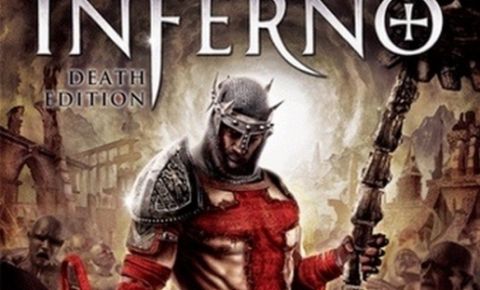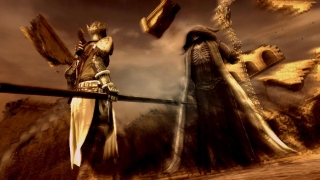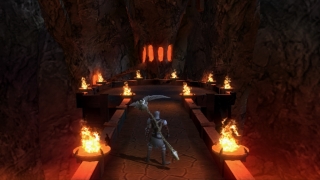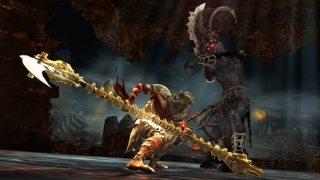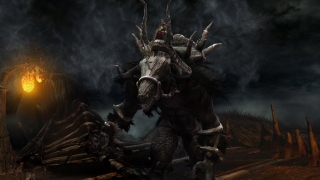A few strangely shaped bodies spring out of the ground. I take most of them out with a series of quick attacks and grab one with the same scythe Death used before I took it from him, after apparently killing Death itself (this happens in the first fifteen minutes of the game and is in the demo, so it's in no way a spoiler).
I can Absolve or Damn him and the good path involves mashing a button really fast so that the light of the Holy Cross gets through to him. Damnation is just a single button press away. The first lesson of Dante's Inferno is that Salvation is quite hard to do and that Damnation is quite accessible. I then proceed to open a door by way of quick button presses, replenish my health and my man by using quick button presses and then taken down Charon via, you guessed it, more quick button presses.
The repetition is just what a new player encounters for the first hour of Dante's Inferno and it all has the potential of making them quit just as the game begins to show off its interesting features.
Plot
You go to Hell. That's all you need to know as you take out wave after wave of enemies, kill a few end bosses, marvel at the amount of fire and brimstone that pops up on screen and nurse a rather sore thumb after a few hours of play.
Of course, Dante's Inferno aims to tell a bigger story. Dante is not an Italian poet widely considered the best his nation had to offer but a Crusader who took part in the third attempt to take over the Holy Land from the infidels. He has also been unfaithful to his wife Beatrice, who is now taken to Hell and whom Lucifer sees as one possible way of again attempting to assault Heaven and God himself. Dante takes the cross his wife gave him long ago and, with the aforementioned Death Scythe, heads to Hell to redeem his sins and save his love. It's a classic heroes tale, which manages to offer an interesting take on violence, religion, political and spiritual power in the first hours before becoming solely concerned with Lucifer and his plans and how Dante can stop Beelzebub from gaining power.
One nice touch is the addition of Virgil, the nickname for Publius Vergilius Maro, a long dead Roman poet who accompanies Dante and gives him details about the areas of Hell he is crossing. All the lines of this character are taken directly from the poem on which the game is very loosely based, giving it at least a flimsy coat of authenticity.
Gameplay
There are quick attacks, hard attacks and blocks, there are combos that must be bought using souls and that can be used either to take out bigger numbers of enemies with just one hit or to deliver heavy damage to just one. There are relics to be found and equipped, giving the player more power in hid fights and even the ability to redeem souls faster than before. There are also silver coins to collect and mystical powers, which can be used when the situation gets dicey in combat. Dante's Inferno throws a lot of things that need to be done at players; unfortunately, it does it while offering a battle and exploration system based too much around the long hated Quick Time Events.
Everything is a QTE, including things that do not need such hassle. Even opening doors, one of the most mundane activities a player can perform is built around a denizen of Hell and his interaction with a Death Scythe that has been jammed into his belly, a belly that blocks the frame of the door. It's nice seeing the animation and doing the actual QTE the first time around but then it's just another chore to perform for pre-designated points. They are everywhere. Interacting with Charon, which could have simply been done by using face buttons for actions you have already performed, means another QTE. It's annoying, breaks the flow of the game and makes it harder to like it.
Otherwise, the combat can be fun. It's not surprising, as Dante's Inferno almost always spawns barriers in order to fend off arenas, but taking out enemies while mixing the scythe, the cross and magic is pretty nice, mainly when the tougher guys make an appearance and a certain amount of dodging and running around is also needed. Of course, it's all ruined by another set of QTEs, which, thankfully, are optional. I suggest finishing all enemies with simple scythe attacks.
The fact that the right stick dashes your character round can also be a problem, especially as the camera tends to swing around to some pretty weird angles at times. It takes a while to get used to, especially if the player comes after some serious sessions with games where the same stick is linked with camera movement.
Graphics and audio
One thing the game does very well is to show off Hell as depicted in Dante’s poem. There are walls made of damned souls, rocks that seem ready to crush the main character and everything else its weight and fires raging everywhere. The sense of lost hope and crushed humanity is everywhere. Visceral also did a very good job at building enemy types around the themes of the various circles in Hell, although some types, like the mini scythe babies, might be a bit too much to handle for more squeamish gamers.
The background sound is also spectacular. Park Dante into a quiet corner of the levels and you will hear the damned as they wail and cry about their lost lives and the impossibility of ascending to Heaven. It's quite powerful stuff and shines in a game, which otherwise uses pretty stock sounds for the fighting sequences and standard voice acting for the character, with Virgil being specifically monotonous.
It's still worth a playthrough if your action adventure sense is tingling and you cannot actually wait until the launch of God of War III. It can offer some nice action sequences and Hell as seen by Visceral is a really interesting place to visit for short bursts. And it will take quite some time to get that wailing sound out of my head.
The Good
The Bad
Conclusion
 14 DAY TRIAL //
14 DAY TRIAL // 